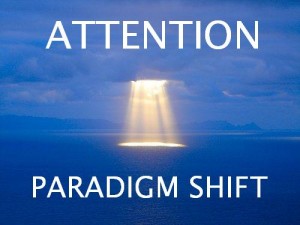 How are new paradigms born?
How are new paradigms born?
Perhaps we can continue a discussion we had years ago around their development because we’re going through a time that’s seeing massive paradigm shifts in society.
Dominant paradigms are breaking down or being overturned, so it may help to review the process.
It goes like this.
We live according to our existing paradigms or core beliefs about life. Then something comes along and brings their validity into question.
We wrestle with it, make a note of it, and watch for repetition.
Repetition shows up and we begin to feel uncomfortable.
More repetition shows up and we resolve to do something about it but we don’t know what.
We sit in discomfort as cognitive dissonance rises – the inner conflict between what we believe to be true and what’s showing up as fact.
Finally cognitive dissonance becomes too great and we cast down the paradigm, without anything to replace it or in allegiance to a new idea that has presented itself.
At the moment of casting down the old paradigm or in the space thus created, a new idea may dawn on us, which, when seen with clearer vision, more closely fits and addresses the circumstances. Or the barriers to accepting an idea that has already arrived fall.
The new idea may be inspired; it may come from dawning awareness. Wherever it comes from, it becomes our new paradigm or belief. This process has been called “paradigmatic breakthrough.” If the breakthrough is lasting, we call it a “paradigm shift.”
We move from paradigm to paradigm, shedding them as a crab does its shell, as long as we rely predominantly on the intellect, which most males seem to do.
Cognitive dissonance seems to be building up in many people at the moment. My purpose in writing this is to say that this may not necessarily be a bad thing, as uncomfortable as it may be.
If we sit with the dissonance and the paradoxes that arise from it, we may reach the point of being totally willing to let go of the old and make room for the new. We call it a lightbulb moment, “Aha!” realization, peak experience, etc.
In my view, that’s how new paradigms are born.

